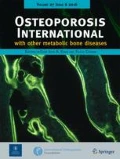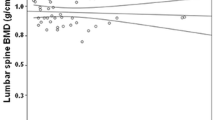Abstract
Summary
Adult-type hypolactasia, as mediated by a widespread genetic predisposition, not only reduces calcium intake but also calcium absorption in the presence of high amounts of lactose and may, therefore, promote osteoporosis. A lactose-reduced diet and lactose-free calcium supplements may reverse this imbalance.
Introduction and hypothesis
Adult-type hypolactasia (HL) defined by the LCT(−13910) polymorphism may reduce calcium intake by reducing dairy consumption and, therefore, promote osteoporosis. This study aimed to evaluate whether lactose also decreases intestinal calcium absorption in subjects with HL and whether lactose-reduced diet and lactose-free calcium supplementation as recommended could maintain bone mineral density (BMD).
Methods
Based on LCT genotyping, 73 postmenopausal women with and without HL underwent a conventional H2 breath test with a concomitant oral strontium absorption test lasting 150 minutes, which closely reflects intestinal calcium absorption. In addition, we compared bone-specific laboratory parameters, lumbar and femoral BMD, and spinal radiographs to a similar bone assessment 5 years earlier.
Results
LCT genotyping and functional lactose malabsorption tests were highly correlated. Dairy product consumption was reduced by 80% in HL individuals. During concomitant lactose application, mean strontium absorption was blunted by 54% in HL subjects after 150 minutes (1272 ± 629 μg/L vs. 2020 ± 1130 μg/L in lactose tolerant subjects, p = 0.001). Nevertheless, BMD in HL subjects remained stable with lactose-free calcium supplements during the observation period.
Conclusion
Both decreased calcium intake as well as lactose-associated impaired calcium absorption may predispose subjects with HL to osteoporosis. Lactose-free calcium supplementation may help to maintain BMD in HL subjects.

Similar content being viewed by others
References
Sahi T (1994) Genetics and epidemiology of adult-type hypolactasia. Scand J Gastroenterol 202:7–20
Jackson KA, Savaiano DA (2001) Lactose maldigestion, calcium intake and osteoporosis in African-, Asian- and Hispanic-Americans. J Am Coll Nutr 20(2):198S–270S
Birge SJ Jr, Keutmann HT, Cuatrecasas P, Whedon GD (1967) Osteoporosis, intestinal lactase deficiency and low dietary calcium intake. N Engl J Med 276(8):445–448
Slemenda CW, Christian JC, Hui S, Fitzgerald J, Johnston CC Jr (1991) No evidence for an effect of lactase deficiency on bone mass in pre- or postmenopausal women. J Bone Miner Res 6(12):1367–1371
Honkanen R, Kroger H, Alhava E, Turpeinen P, Tuppurainen M, Saarikoski S (1997) Lactose intolerance associated with fractures of weight-bearing bones in Finnish women aged 38–57 years. Bone 21(6):473–477
National Institutes of Health Consensus Statement (1994) Optimal calcium intake. Bethesda, MD: National Institutes of Health 94:6–8; 12:1–31
Heaney RP (2000) Calcium, dairy products and osteoporosis. J Am Coll Nutr 19:83S–99S
Obermayer-Pietsch BM, Bonelli CM, Walter DE, Kuhn R, Fahrleitner-Pammer A, Berghold A, Goessler W, Stepan V, Dobnig H, Leb G, Renner W (2004) Genetic predisposition for adult lactose intolerance and relation to diet, bone density, and bone fractures. J Bone Miner Res 19(1):42–47
Enattah NS, Sahi T, Savilahti E, Terwilliger JD, Peltonen L, Jarvela I (2002) Identification of a variant associated with adult-type hypolactasia. Nat Genet 30(2):233–237
Kuokkanen M, Enattah NS, Oksanen A, Savilahti E, Orpana A, Jarvela I (2003) Transcriptional regulation of thelactase-phlorizin hydrolase gene by polymorphisms associated with adult-type hypolactasia. Gut 52(5):647–652
Högenauer C, Hammer HF, Mellitzer K, Renner W, Krejs GJK, Toplak H (2005) Evaluation of a new DNA test compared with the lactose hydrogen breath test for the diagnosis of lactase non-persistence. Eur J Gastroenterol Hepatol 17(3):371–376
Hammer HF, Fine KD, Santa Ana CA, Porter JL, Schiller LR, Fordtran JS (1990) Carbohydrate malabsorption. Its measurement and its contribution to diarrhea. J Clin Invest 86(6):1936–1944
Obermayer-Pietsch BM, Bonelli CM, Walter DE, Kuhn R, Fahrleitner-Pammer A, Berghold A, Goessler W, Stepan V, Dobnig H, Leb G, Renner W (2004) Genetic components of lactose intolerance and community frequency. J Bone Miner Res 19(10):1747
Matthews SB, Waud JP, Roberts AG, Campbell AK (2005) Systemic lactose intolerance: a new perspective of an old problem. Postgrad Med J 81(953):167–173
Schaafsma G, Visser R (1980) Nutritional interrelationships between calcium, phosphorus and lactose in rats. J Nutr 10(6):1101–1111
Zittermann A, Bock P, Drummer C, Scheld K, Heer M, Stehle P (2000) Lactose does not enhance calcium bioavailability in lactose-tolerant, healthy adults. Am J Clin Nutr 71(4):931–936
Sips AJ, Netelenbos JC, Barto R, Lips P, van der Vijgh WJ (1994) One-hour test for estimating intestinal absorption of calcium by using stable strontium as a marker. Clin Chem 40(2):257–259
Blumsohn A, Morris B, Eastell R (1994) Stable strontium absorption as a measure of intestinal calcium absorption: comparison with the double-radiotracer calcium absorption test. Clin Sci (Lond) 87(3):363–368
Reid IR, Pybus J, Lim TM, Hannon S, Ibbertson HK (1986) The assessment of intestinal calcium absorption using stable strontium. Calcif Tissue Int 38(5):303–305
Barger-Lux MJ, Heaney RP (2005) Calcium absorptive efficiency is positively related to body size. J Clin Endocrinol Metab 90(9):5118–5120
Cochet B, Jung A, Griessen M, Bartholdi P, Schaller P, Donath A (1983) Effects of lactose on intestinal calcium absorption in normal and lactase-deficient subjects. Gastroenterology 84:935–940
Nordin BE, Need AG, Morris HA, O’Loughlin PD, Horowith M (2004) Effect of age on calcium absorption in postmenopausal women. Am J Clin Nutr 80(4):998–1002
Heaney RP, Recker RR, Stegman MR, Moy AJ (1989) Calcium absorption in women: relationships to calcium intake, estrogen status, and age. J Bone Miner Res 4(4):469–475
Gallagher JC, RApuri PB, Haynatzki G, Detter JR (2002) Effect of discontinuation of estrogen, calcitriol, and the combination of both on bone density and bone markers. J Clin Endocrinol Metab 87(11):4914–4923
Dawson-Hughes B (2003) Interaction of dietary calcium and protein in bone health in humans. J Nutr 133(3):852–854
Krall EA, Dawson-Hughes B (1999) Smoking increases bone loss and decreases intestinal calcium absorption. J Bone Miner Res 14(2):215–220
Di Stefano M, Veneto G, Malservisi S, Strocchi A, Corazza GR (2001) Lactose malabsorption and intolerance in the elderly. Scand J Gastroenterol 36(12):1274–1278
Goulding A, Taylor RW, Keil D, Gold E, Lewis-Barned NJ, Williams SM (1999) Lactose malabsorption and rate of bone loss in older women. Age Ageing 28(2):175–180
Enattah NS, Sulkava R, Halonen P, Kontula K, Jarvela I (2005) Genetic variant of lactase-persistent C/T-13910 is associated with bone fractures in very old age. J Am Geriatr Soc 53(1):79–82
Obermayer-Pietsch BM, Bonelli CM, Walter DE, Kuhn R, Fahrleitner-Pammer A, Berghold A, Goessler W, Stepan V, Dobnig H, Leb G, Renner W (2004) Genetic disposition for adult lactose intolerance and relation to bone properties and fractures during lifetime. Calcif Tissue Int 74(S1):128
Enattah N, Valimaki VV, Valimaki MJ, Loyttyniemi E, Sahi T, Jarvela I (2004) Mlecularly defined lactose malabsorption, peak bone mass and bone turnover rate in young finnish men. Calcif Tissue Int 75(6):488–493
Enattah N, Pekkarinen T, Valimaki MJ, Loyttyniemi E, Jarvela I (2005) Genetically defined adult-type hypolactasia and self-reported lactose intolerance as risk factors of osteoporosis in Finnish postmenopausal women. Eur J Clin Nutr 9(10):1105–1111
French MR, Moore K, Vernace-Inserra F, Hawker GA (2005) Factors that influence adherence to calcium recommendations. Can J Diet Pract Res 6(1):25–29
Gugatschka M, Dobnig H, Fahrleitner-Pammer A, Pietschmann P, Kudlacek S, Strele A, Obermayer-Pietsch B (2005) Molecularly-defined lactose malabsorption, milk consumption and anthropometric differences in adult males. QJM 98(12):857–863
Kanis JA, Johansson H, Oden A, De Laet C, Johnell O, Eisman JA, McCloskey E, Mellstrom D, Pols H, Reeve J, Silman A, Tenenhouse A (2005) A meta-analysis of milk intake and fracture risk: low utility for case finding. Osteoporosis Int 16(7):799–804
Teegarden D, Legowski P, Gunther CW, McCabe GP, Peacock M, Lyle RM (2005) Dietary calcium intake protects women consuming oral contraceptives from spine and hip bone loss. J Clin Endocrinol Metab 90(9):5127–5133
Hertzler SR, Huynh BC, Savaiano DA (1996) How much lactose is low lactose? J Am Diet Assoc 96(3):243–246
Ridefelt P, Hakansson LD (2005) Lactose intolerance: lactose tolerance test versus genotyping. Scand J Gastroenterol 40(7):822–826
Cummings SR, Melton LJ III (2002) Epidemiology and outcomes of osteoporotic fractures. Lancet 359(9319):1761–1767
Seely S (2000) Possible connection between milk and coronary heart disease: the calcium hypothesis. Med Hypotheses 54(5):701–703
Rasinpera H, Forsblom C, Enattah NS, Halonen P, Salo K, Victorzon M, Mecklin JP, Jarvinen H, Enholm S, Sellick G, Alazzouzi H, Houlston R, Robinson J, Groop PH, Tomlinson I, Schwartz S Jr, Aaltonen LA, Jarvela I, FinnDiane Study Group (2005) The C/C-13910 genotype of adult-type hypolactasia is associated with an increased risk of colorectal cancer in the Finnish population. Gut 54(5):643–647
Author information
Authors and Affiliations
Corresponding author
Rights and permissions
About this article
Cite this article
Obermayer-Pietsch, B.M., Gugatschka, M., Reitter, S. et al. Adult-type hypolactasia and calcium availability: decreased calcium intake or impaired calcium absorption?. Osteoporos Int 18, 445–451 (2007). https://doi.org/10.1007/s00198-006-0251-6
Received:
Accepted:
Published:
Issue Date:
DOI: https://doi.org/10.1007/s00198-006-0251-6




